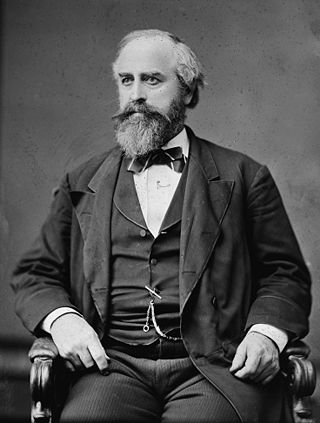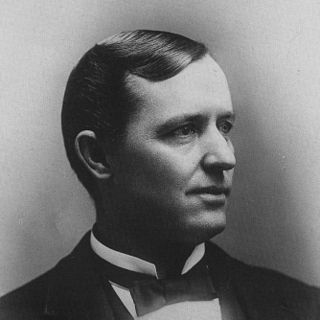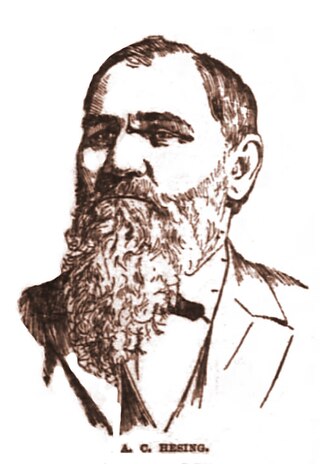
Stephen Grover Cleveland was an American politician who served as the 22nd and 24th president of the United States from 1885 to 1889 and from 1893 to 1897. He is the only president in U.S. history to serve non-consecutive presidential terms. In the years before his presidency, he served as a mayor and as governor of New York state, winning fame as an anti-corruption crusader. Cleveland was the first Democrat to win the presidency after the Civil War, and was one of two Democratic presidents, followed by Woodrow Wilson in 1912, in an era when Republicans dominated the presidency between 1869 and 1933. He won the popular vote in three presidential elections—1884, 1888, and 1892. Benjamin Harrison won the electoral college vote, and thus the presidency, in 1888.

Carter Henry Harrison Sr. was an American politician who served as mayor of Chicago, Illinois, from 1879 until 1887 and from 1893 until his assassination. He previously served two terms in the United States House of Representatives. Harrison was the first cousin twice removed of President William Henry Harrison, whose grandson, Benjamin Harrison, had also been president until just months prior to the assassination. He was also the father of Carter Harrison Jr., who would follow in his father's footsteps, and would serve five terms as the mayor of Chicago himself.

The 1884 United States presidential election was the 25th quadrennial presidential election, held on Tuesday, November 4, 1884. In the election, Governor Grover Cleveland of New York defeated Republican James G. Blaine of Maine. It was set apart by unpleasant mudslinging and shameful personal allegations that eclipsed substantive issues, such as civil administration change. Cleveland was the first Democrat elected president of the United States since James Buchanan in 1856, the first to hold office since Andrew Johnson left the White House in 1869, and the last to hold office until Woodrow Wilson, who began his first term in 1913. For this reason, 1884 is a significant election in U.S. political history, marking an interruption in the era when Republicans largely controlled the presidency between Reconstruction and the Great Depression.

Adlai Ewing Stevenson I was an American politician who served as the 23rd vice president of the United States from 1893 to 1897 under President Grover Cleveland. A member of the Democratic Party, Stevenson served as a U.S. Representative for Illinois in the late 1870s and early 1880s. He was the founder of the Stevenson political family.

Walter Quintin Gresham was an American attorney, jurist, statesman, and politician who served in the cabinets of presidents Chester A. Arthur and Grover Cleveland.

Lee Mantle was an American businessman and politician from Montana. A Republican, he was most notable for his service as a United States Senator from 1895 to 1899.

Illinois Staats-Zeitung was one of the most well-known German-language newspapers of the United States; it was published in Chicago from 1848 until 1922. Along with the Westliche Post and Anzeiger des Westens, both of St. Louis, it was one of the three most successful German-language newspapers in the United States Midwest, and described as "the leading Republican paper of the Northwest", alongside the Chicago Tribune. By 1876, the paper was printing 14,000 copies an hour and was second only to the Tribune in citywide circulation.

Hermann Raster was an American editor, abolitionist, writer, and anti-temperance political boss who served as chief editor and part-owner of the Illinois Staats-Zeitung, a widely circulated newspaper in the German language in the United States, between 1867 and 1891. Together with publisher A.C. Hesing, Raster exerted considerable control over the German vote in the Midwest and forced the Republican Party to formally adopt an anti-prohibition platform in 1872, known as the Raster Resolution. He was appointed as Collector of Internal Revenue for the First District of Illinois by President Ulysses S. Grant but resigned from this post shortly thereafter. Raster returned to Europe in 1890 when his health began to fail him and died filling a minor diplomatic role in Berlin. Today he is best remembered for his extensive correspondence with Western intellectual and political figures of the time, such as Joseph Pulitzer, Elihu Washburne, and Francis Wayland Parker, much of which is preserved at the Newberry Library in Chicago.

Thomas Gahan was an American politician and business executive in Chicago.

Anton Caspar Hesing (1823–1895), known as "Boss Hesing", was a German-American newspaper publisher and political boss who became a prominent figure in Chicago during the second half of the 19th Century. The long-time publisher of the Illinois Staats-Zeitung and political boss of the pro-liquor wing of the Republican Party, Hesing is remembered as one of the most influential figures of the 1870s in the emerging metropolis of Chicago, responsible, alongside his compatriot Hermann Raster, for the adoption of a national anti-temperance platform for the Republican Party in 1872, the creation of the People's Party in 1873, and the subsequent election of Harvey Doolittle Colvin as Mayor of Chicago. During his final years, the wealthy Hesing engaged in a number of philanthropic ventures, including a large role in financing of Chicago's Schiller Theater.
John C. Karel Sr. was an Austrian Empire born American banker, and Democratic politician. He was a member of the Wisconsin State Assembly, representing Kewaunee County during the 1879 session. During the presidency of Grover Cleveland, he served as U.S. consul at Prague and Saint Petersburg.

Joseph Brucker was an Austrian American newspaper editor who was active in the Republican Party, serving as Secretary of the Wisconsin Republican State Convention and as a member of the Illinois Republican State Central committee.

Chicago has held regularly-scheduled popular elections to select the city's mayor ever since it was incorporated as a city in 1837.

In the Chicago mayoral election of 1935, incumbent Interim Mayor Edward J. Kelly defeated Republican Emil C. Wetten and independent candidate Newton Jenkins by a landslide 60% margin of victory.

In the Chicago mayoral special election of 1893, John Patrick Hopkins was elected mayor. The election was triggered by the assassination of mayor Carter Harrison Sr.. Following Harrison's death, Republican George Bell Swift had been appointed by City Council to serve as acting mayor until the special election could be held. In the election, which was held December 19, Hopkins narrowly defeated Swift by a half-percent margin.

In the Chicago mayoral election of 1893, Democrat Carter Harrison Sr. won election, returning him the mayor's office for a (then-record) fifth non-consecutive term as mayor of Chicago. Harrison won a majority of the vote, defeating the Republican nominee, businessman Samuel W. Allerton, by a ten point margin. He also defeated two third-party candidates: United Citizens nominee DeWitt Clinton Cregier and Socialist Labor Party nominee Henry Ehrenpreis, neither of whom received strong support.

In the Chicago mayoral election of 1869, Citizens Party nominee Roswell B. Mason defeated Republican nominee George W. Gage by a landslide 27-point margin.

In the Chicago mayoral election of 1895, was held on Tuesday April 2 Republican candidate George Bell Swift was elected, winning a majority of the vote and defeating Democratic nominee Frank Wenter by more than a fifteen-point margin.

In the Chicago mayoral election of 1897, Democratic nominee Carter Harrison Jr. was elected, winning a majority of the vote and defeating independent Republican John Maynard Harlan, Republican nominee Nathaniel C. Sears, independent Democrat Washington Hesing, as well as several minor candidates. Harrison carried a 26.7 point lead over second-place finisher Harlan, a margin greater than Harlan's vote share itself.

Frank A. Wenter Sr. was a German-born American politician who served as president of the Chicago Sanitary District and who was the unsuccessful nominee of the Democratic Party in the 1895 Chicago mayoral election.














